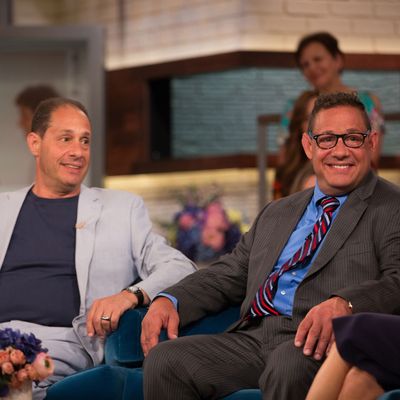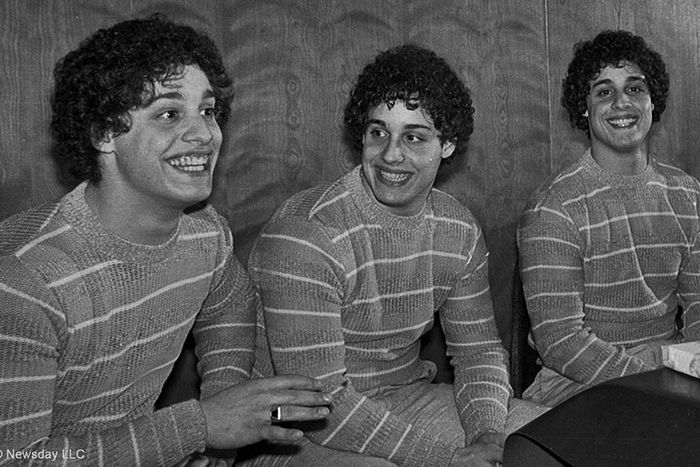
When you consider the demands of the Oscar season, it’s a wonder anyone in Hollywood gets any work done at all. The Venice Film Festival, which serves as the traditional opening bell, unrolls its carpets in late August, and the Academy doesn’t hand out its awards until late February; in between are six months of big festivals, small festivals, critics groups’ dinners, Academy meet-and-greets, and precursor ceremonies. This is hard enough for movie stars, who are presumably prepared, but the expansion of awards season has come alongside a boom in documentary films, pulling in box-office numbers like never before. The Best Doc race is now only slightly less intense than the main categories, which means that an entire generation of mild-mannered documentary filmmakers, as well as their regular-people subjects, is now wining and dining Oscar voters as if they had been trained by Harvey himself.
Fortunately, Bobby Shafran and David Kellman have been through this kind of thing before. Along with their brother Eddy Galland, the three men are at the center of Tim Wardle’s Three Identical Strangers, which tells their remarkable true story. Raised unaware of the others’ existence, they found each other in 1980, when a teenage Bobby enrolled at a community college Eddy had just dropped out of. A friend arranged a meeting between the two doppelgängers, who realized they were identical twins who’d been separated by an adoption agency. What was already a pretty great human-interest story got even better when David saw the news, and it came out that the twins were actually triplets. The brothers were a media sensation — three Tri-State Area good-time guys who delighted audiences by dressing identically, moving identically, and talking about their identical tastes in cigarettes, high-school sports, and women. It wasn’t a bit. They all moved into the same New York apartment, and eventually opened an old-school Jewish steakhouse called Triplets, which the Associated Press once called “intentionally just a tad tacky.”
“We were this impenetrable triumvirate,” Bobby said at a recent coffee with David before the pair attended an informal meet-and-greet with Oscars voters. “We woke up together, we went to work together, we went to school together. We did everything together.” That’s the first act of Wardle’s film, the part of the story you may remember if you were alive at the time. It soon gets darker.
By the mid-‘90s, the first cracks in brothers’ relationship had emerged. Bobby had left the restaurant, and Eddy had been diagnosed as bipolar. In 1995, he killed himself. Two years later, news came out that the brothers had not been raised apart by accident. They had been unwitting subjects in a study that placed identical twins and triplets in different households to explore issues of nature versus nurture. (The boys’ parents had been told they were taking part in a normal child-development study.) All three brothers had mental-health problems in their youths, and now the two survivors wondered whether their separation as infants had contributed to their issues. In an additional wrinkle, the research team included European refugees from the Holocaust. As Bobby says in the film, it’s “some Nazi shit!”
With secret siblings, mysterious conspiracies, and a tragic ending, it was a tale to rival any of the other real-life dramas that have anchored the recent wave of true crime, and multiple documentarians had tried their hands at it before Three Identical Strangers. All of those projects had fallen through for one reason or another; viewers of the film are left with the impression that powerful people connected to the twin study would prefer the story fade away.
When the filmmakers approached them, Bobby and David had not done any official interviews together since Eddy’s death. In middle age, the brothers weren’t estranged, exactly, but they weren’t close. “We were not talking, but it wasn’t as though we wouldn’t talk to one another,” Bobby said over coffee. “David and I tried to make attempts at building a relationship in fits and starts, but —”
“Feeble!” David interjected, a foot away.
What’s feeble?
“He’s being feeble and he’s talking about getting together before we become feeble,” David explained. “It’s an underlying theme, if you will.”
After their original reunion, friends would remark how the triplets seemed to be regressing into childhood, which is a more clinical way of saying that they would sometimes pee on each other. Even after years apart, there is still an element of youthful rivalry there.
“We’re the surviving two,” Bobby said, to explain what made the brothers ultimately decide to come back together for the film. “For us to fuck this thing up, or throw it away, or not value it for the invaluable thing that it is, would just be a …”
“A shonda!” shouted David.
“… a wasteful feeling on a very human level.”
“A shonda — a shame or a waste. Your last 14 sentences in one word.”
At this, Bobby’s glass of water made its way onto David’s face.
Even though Wardle and producers Grace Hughes-Hallett and Becky Read spent a lot of time working to establish the brothers’ trust, Bobby and David couldn’t help being suspicious. In their experience, people in the media didn’t always do what they said they were going to do. And it didn’t help that the filmmakers were from the U.K. Bobby knew what the British press was like: “There’s no First Amendment there, which is astonishing. They still come up with this amazingly sensationalistic shit!”
Filming was intense — ten-hours days spent reliving the most emotionally fraught moments of their lives. “We were bringing up things that hadn’t been discussed in that much detail in many, many years. And it was not easy to do,” David said. “One question led to another, then that question led to another.”
“When we were done, we were done. There was nothing left,” said Bobby. “We walked out of there drained, toast.”
Even while they were shooting, Bobby and David weren’t 100 percent confident that they weren’t going to get screwed over. Since Wardle didn’t let on who else he was talking to, there were a few awkward moments when they discovered this family member, or that old friend, had just shot an interview for the documentary. They didn’t even know Tim was back in town! Their own interviews, too, happened separately: Each brother wasn’t exactly sure what the other was going to say.
When the film was finally finished, Wardle made sure to fly back to America to screen his cut to each of the guys in person. “In each case, the same thing happened,” Bobby recalled. “David got up, I got up, we both hugged him and said, ‘Thank you.’ There was no betrayal of our trust in any way. We weren’t expecting it.” That’s not to say there were zero surprises. Neither Bobby nor David had ever heard of Natasha Josefowitz, a research assistant on the twin study who became a respected academic; she appears in the documentary as an impish nonagenarian who’s a little less contrite than you might expect. “She comes across as a super-villain,” David said. “We didn’t even know she existed!”
Three Identical Strangers made it into Sundance, the start of a whirlwind 12 months for the brothers. First, the film won the Special Jury Award for Storytelling at the festival. Then it was acquired by Neon, who released it in July to uniformly positive reviews. It’s currently the third highest-grossing doc of the year, right behind Won’t You Be My Neighbor? and RBG, both of which happen to be its main competition this Oscars season.
All of this has come with a lot of promo — New York, L.A., San Francisco, Austin, you name it. The brothers are happy to do it, as long as Neon feeds them and puts a roof over their heads. (“We’re still not getting anything for free!” joked David.) Everywhere people want to talk to them about the film, which is a little weird, because they didn’t make it; it’s just a record of what happened to them. But it’s been a great experience, spending all this time with each other. They are even playing golf together. Or at least, Bobby said, “David plays golf, I walk around the golf course and follow the ball.”
It feels different than their first go-round in the early ‘80s. Back then, Bobby said, “We were celebrating each other and ourselves, and people were celebrating with us.”
“We were also 19, and Eddy was part of it. A lot of dynamics have changed,” said David. In the film, a friend points out that, because the brothers had been thrown together as teenagers, their relationship didn’t have the benefit of a shared childhood foundation. Now, the base is a little more stable. They’ve both been married, and each has kids of his own. And they’ve gotten close with the filmmakers, too, so it’s almost like, for the second time in their lives, they’ve discovered a new family.
As a result of the movie, they’ve also gotten their hands on some of the records from the study, including footage of themselves performing tests as babies. “I really felt a violation watching the real early stuff, where you can see the psychologist’s hands pushing puzzle pieces around,” said David. Though all the boys stopped participating in the study by adolescence, they’ve since learned that researchers were secretly tracking their lives for years afterward — some Stasi shit.
The old dreams of fame have not entirely gone away. Wardle’s production company is developing a feature version of the story, and everyone is enjoying coming up with young actors who could play the part of all three boys. (“I like Melissa McCarthy for David,” says Bobby.) David took some time off from work to promote the film — he commutes to Manhattan events on New Jersey Transit — but he needs to go back soon. “I’m in the insurance business, and a lot of my income is residual income,” he explained. “Sooner or later, you’ve got to keep feeding that dragon. You run out of gas.” (Bobby hasn’t worked full-time after hurting himself in a 2011 motorcycle accident.) “But we’ll see what’s happening,” David said. “We could get a phone call.”
“Maybe some opportunities,” said Bobby.
What kind of opportunities?
“Either dramatic or commercial opportunities, or some kind of spokesperson kind of thing,” said David. “That’s what they do with old actors, right?”
“A lot of people who have mentioned they find us engaging public storytellers,” Bobby added. “We certainly won’t spurn them. We’ve heard a lot of chatter, but chatter is chatter until it becomes real.”
After coffee, the guys headed up to Chumley’s in the West Village, to mingle with Oscar voters who’d just seen the film. There they were treated to many of the same questions they’d just been asked: What was their relationship like before the movie? How did they decide to trust the filmmakers? What have they learned about the study since the movie opened? They answered each one as if hearing it for the first time, mixing in a few brotherly insults along the way.
The best part of meeting all these people who loved the film, David had explained over coffee, was the sense of validation: “It’s like, we weren’t wrong to feel fucked up about this.” This validation turns out to take many forms. As the Q&A session wound down, an Academy member had one last thing to tell the brothers. He’d been to Triplets back in the day, and it was fantastic.



